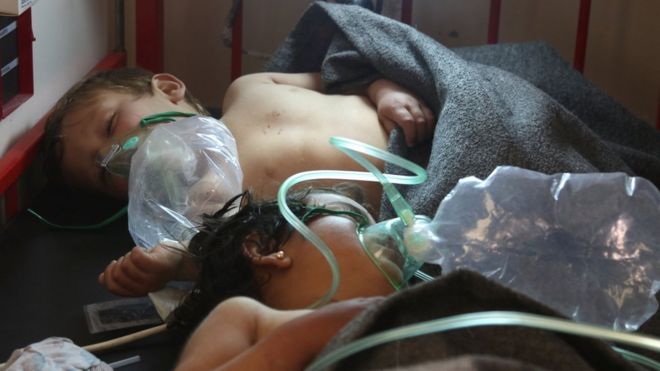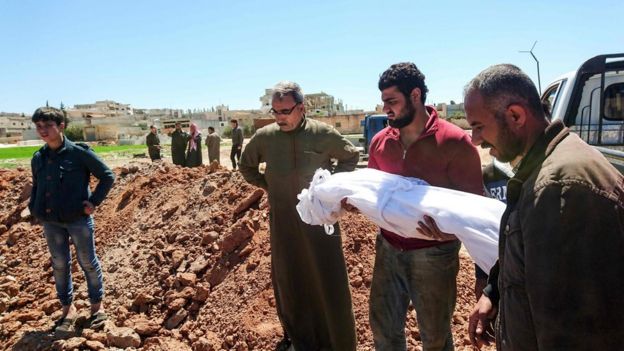Would You Believe It?
"The difference between now and one week ago is that Assad and his backers had reasonably concluded they could fight their war however they wished, with impunity, and that the United States was a nuisance but not a threat."
"Now, we can say that when the United States takes an official position on an issue -- in this conflict, its rivals will have to factor that into their plans."
Faysal Itani, senior resident fellow, Atlantic Council, Washington
"Assad doesn’t have anywhere close to the men to retake his territory, that’s why he’s using chemical weapons."
"This [US strike] is a clear message he will not be able to gas his way over the two-thirds of Syrian territory outside his control."
Andrew Tabler, Syria expert, Washington Institute for Near East Policy.
"We should not invest the limited American military attack with any strategic connotations so far. It’s an attack divorced from any strategic political vision. It remains to be seen whether the Trump administration has any concrete ideas to find a political solution. I’m very skeptical."
"This administration is enamored with hard power, [but] without soft power – without diplomacy, and a political strategy – military actions might be counter-productive."
Fawaz Gerges, Middle East expert, London School of Economics (LSE)
"Obviously, Trump has framed this through a narrow proliferation lens, and the attacks were very limited. But I don’t think anyone else on the ground or internationally is going to see them through that same narrow lens."
"For [Syria’s] opposition and its backers, there’s long been a sense that once you get U.S. skin in the game, an escalatory cycle will quickly take over."
Julien Barnes-Dacey, a Middle East analyst at the European Council on Foreign Relations, Brussels
 |
| More than 80 people have been killed in a suspected chemical attack on the rebel-held town of Khan Sheikhoun in north-western Syria. AFP |
Plenty of opinion from home and abroad, weighing in on the surprise turn-about of Donald Trump's presidency, going from an isolationist, disinterested cast, to outraged intention of involvement, however limited, to serve as a warning that where that came from, ample more exists, should Bashar al-Assad persist in using chlorine, napalm or sarin as a weapon against his civilian Sunni population.
That's the thing about someone whose persona is so volatile and unreadable; just when you're led to believe that he's looking elsewhere, he zeros in and you're the target.
President Assad has six years of brutal warfare under his belt, and though at one juncture he was fairly desperate, he has since, thanks to Hezbollah, the Iranian Republican Guard Corps al-Quds division, and principally now the Russian air strikes gained immeasurably in confidence to the point of straining even his capacity for hubristic demonstrations of barbarity.
The little dictator who inherited his genetic propensity from his father and uncle is a fanatic of another stripe.
This fierce opponent of "terrorism" who labels any group that opposes his Baathist vision of Shiite governance an Islamist terrorist entity has slaughtered far more people than the despised and feared Islamic State of Iraq and the Levant. Not that Islam State hasn't made the effort; it simply lacks all the mechanisms and equipment at the disposal of an advanced state.
And Assad demonstrates with a high degree of accuracy all the requisite manifestations of a terrorist himself.
No number of atrocities too burdensome for a man without a conscience whose conniving enterprise has geared toward imposing fear and death on unarmed civilians. His killing machine has worked overtime on the thousands he plunks into his prisons, on civilians huddled for shelter in bomb-destroyed enclaves of a once prosperous economy, dropping hundreds of crude barrel bombs weekly on the defenceless.
There is something acutely disturbing however, about the impact of seeing a child dying before your eyes, mouth foaming, eyes turned inward, gasping for breath in reaction to deadly chemicals infusing its nervous system to an agonizing death. Why that same child writhing in agony over the impact of sharp pieces of shrapnel biting into his body or disembowelling him, or beheading him in the process of the kill does not elicit a similar reaction is a puzzle.
The background story on demolishing the lives of close to a half million Syrians, and creating refugees out of millions more is bloodlust and vengeance by a lunatic who has the support of those whose own exploits reek of ambitions to be met and conquests to gain while in the process nourishing the ideology of jihad on the one hand, political opponents' assassinations on the other. When the northern city of Aleppo was cleared of rebels and Sunni civilians in a starvation siege, the world yawned.
Doesn't President Trump know that Presidents Putin and Assad are furious over his decision to intervene in so inconveniently untimely a manner as to upset their ongoing plans? Doesn't it bother him that they accuse the United States of assaults against international norms and laws? Those fine, upstanding exemplars of international rules and regulations, those outstanding champions of human rights.
 |
| Residents of Khan Sheikhoun began burying the victims of the incident on Wednesday AFP |
"I now have responsibility, and I will have that responsibility and carry it very proudly, I will tell you that."
"It is now my responsibility."
U.S. President Donald J. Trump
"I suspect that the Russians are furious with their ne'er-do-well client. Why in the world would you use chemicals when everything is going your way?"
"[Military action] would not likely reverse the tide of the conflict against Assad. But it could be significant enough to teach Assad that mass civilian casualty events will no longer be cost-free. This would be important, because as long as civilians are on the bullseye, there can be no meaningful or productive peace negotiations."
Frederic Hof, director, Rafik Hariri Center for the Middle East
Labels: Atrocities, Chemical Weapons, Civil War, Hezbollah, Iran, Russia, Syria, United States

<< Home